

General Information about Border Collie Rescue
Registered throughout the UK as Border Collie RescueCharity No 1128983 (UK) - Charity No SC040796 (Scotland)
Non-Profit Charitable Company No 3037504
Established in 1976 - first Registered in 1995
What is Border Collie Rescue - what do we do - why are we needed?
The Border Collie Rescue Society is a specialised Breed Rescue registered charity, incorporated as a non profit distributing charitable company, limited by guarantee, entirely run and staffed by volunteers.
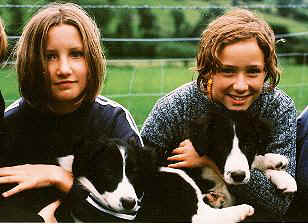
rescue pups at a farm visitors centre that fosters for BCR.
The kids are taught a greater understanding of this special
breed, while the pups benefit from the socialisation and
trust they learn from regular meetings with visitors.
Our registered name is Border Collie Rescue and we operate as
Border Collie Rescue in England and Wales, Border Collie Rescue UK
worldwide and Border Collie Rescue Scotland - in Scotland.
We take in, care for,
rehabilitate, re-train and re-home un-wanted Border Collies and Working Sheepdogs
Those we cannot responsibly re-home are kept in long term foster care for the rest of their life, under the supervision, care and protection of the Society.
In addition to this work we offer help, advice, contacts and hope to Border Collie owners having problems with their dogs, who wish to find a solution that will enable the dog to remain with them, rather than have to re-home.
We work closely with many other canine and animal welfare charities for the future and benefit of the breed.
Our commitment to the future of the Border Collie extends beyond rescuing and re-homing them.
We believe that education and accurate information is the key to the prevention of most of the problems that we have to address daily and we are active in working to help people gain a greater understanding of the breed.
Our goal is to achieve a future where demand for our re-homing service is greatly reduced, if not eradicated.
Where do all the dogs come from? Why do so many need new homes?
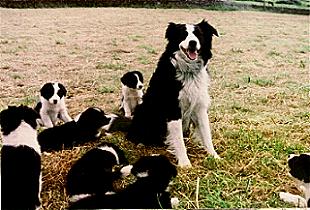
in matters of internal discipline and the settling
of disputes, the pups also learn good manners with
each other and strange dogs.
The reasons for Border Collies needing to be rescued and placed in new homes are as individual and interesting as the dogs themselves.
Each comes with its own unique story.
Some are referred to us as strays, some are non-workers passed on from farms, some are victims of circumstances that make it impossible for their owners to keep them and a few victims of cruelty and neglect.
The highest proportion are unwanted pets who have developed issues that make them a liability in their current home, obliging their owners to seek help to re-habilitate, re-train or re-home them.
Many of those are bought as fluffy puppies from farms, sometimes on impulse when people are on holiday.
Tthe reality of the responsibility sinks in when the family returns home and find they have a frustrated sheepdog in their living room and have second thoughts, turning to us for the solution.
Increasingly, dogs are victims of recession as unemployment and repossession bring the family pet into our care.
Many are fit, well balanced and socialised but there are also dogs which, in the wrong homes, present major problems.
What is the root of the breeds problems?
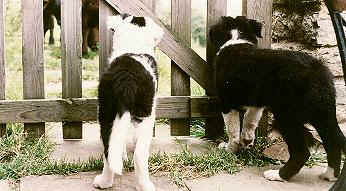
age their interest can show and it can be difficult to get their
attention when obsession sets in.
Border Collies have been developed over hundreds of years to be working dogs, specifically designed and bred for generation upon generation to fulfill a useful role for man - that of herding and protecting livestock.
Over centuries, farmers, shepherds and stockmen have intentionally bred to enhance the qualities needed to herd and selected the best dogs to breed from in order to strengthen the instincts that the breed relies on to carry out this work.
This is the inheritance of all Border Collies, anywhere in the world.
The breed is ruled by its instincts.
Most Border Collies have a need to be active and stimulated. If this need is unfulfilled the dog can become frustrated, irritable and unpredictable.
Whilst the majority of Border Collies are eager to please, quick to learn, loyal and kind, some will still chase anything that moves, often nipping their targets.
Chasing is natural behaviour for a Border Collie. It only becomes a problem when the target is human - perhaps a child, a fast moving vehicle or another dog ( that may not take kindly to being rounded up and penned in a corner ).
Some Border Collies become possessive over toys, food or their owners.
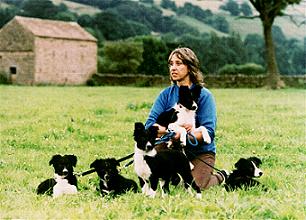
fostered at Hazel Brow Farm
The breed has a natural inclination to bond closely with one person.
This ability enables the dog to respond and work with its handler and other dogs as part of a team and is a highly desirable quality in a sheepdog.
Without work and exercise to take the edge off the dogs intensity this bonding can result in over possessiveness, particularly if the dog is being kept as a pet and is receiving a lot of attention from one person.
The instinct to bond gets overstimulated and the dog begins to regard intrusions on what it regards as its territory or property with resentment. People or other dogs can be bitten in pre-emptive defence if they come to close to its owner, invade its space or attempt to handle its possessions or food.
If unchecked, this behaviour can escalate to include its handler who can suddenly find themselves nipped or bitten by a dog that has never shown them any aggression before.
Border Collies are not a naturally aggressive breed, most problems are behavioural and many can be corrected by experienced trainers and handlers.
How does BORDER COLLIE RESCUE help ?
In the first instance, we can assess dogs, look at their problems and potential and offer advice on training.
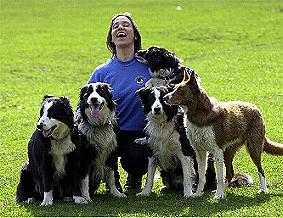
Every dog is an individual. Most come with problems.
These had few, but were still re-homed carefully.
The two on the left are brothers that had lived
together all their lives and were re-homed together.
It's always better to try and help keep a dog in its existing home.
Part of our work involves assessing all the dogs we take in around sheep and other livestock to ascertain their working ability in order to be able to consider these factors before re-homing because we believe any Border Collie, but particularly a puppy, should always have a chance to work and
fulfill its natural instincts.
If being a sheepdog is what it needs to do to have a happy and fulfilled life, we should find that out and
facilitate it.
Knowledge of a Border Collies herding, chase and working inclinations help us prevent a puppy or dog with these qualities ending up in homes where their instincts are frustrated, causing problems for people kind enough to offer a home and issues for the dog in adapting to an unsuitable lifestyle.
The herding assessment will often indicate the root of a behavioural issue as much of the breeds behaviour is underpinned by its instincts to chase.
If this instinct is strong in a dog, a herding home may suit it better.
If weak, there are various ways of diverting the behaviour into something less harmful.
If a problem is serious we can often put people in touch with an appropriate specialist or organisation that can help their individual case.
If owners are unable to resolve problems or cannot keep their dog for any reason, we may be able to help by taking the dog into our care and looking for a new, more suitable, home for the dog.
Unfortunately we cannot take in every dog we are asked to so this is not always an option, but we can often help resolve problems in some way and will always try and help a dog to stay in its home if that is the preference of the owner and the home itself is not creating the problem.
Handling and dealing with ' PROBLEM ' Dogs
Any dog with a training or behavioural issue that we take into our care will not be offered to a new home until the problem is under control or resolved
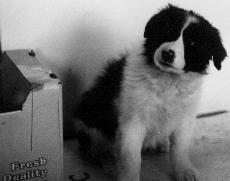
A first assessment is made, sometimes before the dog comes into our care, and afterwards the dog is either fostered on to an appropriate handler / trainer or comes to our rehab centre for care. Whatever provides the best option for rehabilitation.
After an initial period of peace and quiet away from its previous circumstances the dog is re-assessed and a program of training and socialisation, designed for the dogs individual needs, is implemented.
It is often the case that after the initial settling in period a dog will change its unsociable behaviour becoming receptive to re-training and eager to get it right.
We are never in a hurry to push dogs out to new homes or to rely on a new owner of a dog to deal with any issues it may have - as best they can.
As far as we are concerned, to rescue a dog goes further than just getting it out of a difficult situation.
It means sorting out the problems and issues so the dog has a future.
A dog will stay with us as long as it takes to get it to the point that we feel we can responsibly re-home it. Sometimes there is a limit to what can be done and on occasions there is a point where we can do no more for a dog because it has reached the point where it will progress further in a new home where it can get the full attention of its new owners.
When we are satisfied that the dog has improved to the point that the problem is resolved or under control, it can be found a new home in a suitable environment with the right people.
WHEN A DOG COMES IN.
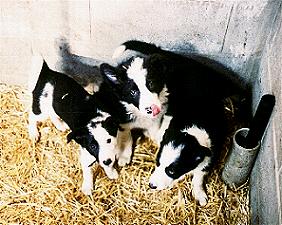
Just settling in to foster care at Hazel Brow Farm
We can only take dogs from their legal owners.
If a dog has no legal owner due to death or incapacity, then the owners executors or legally appointed representatives can sign it over.
In the case of strays, we can only take those from council pounds where they have spent at least seven days in order that the laws governing statutory transfer of ownership are satisfied.
This applies to all charities unless they also happen to be the local authorities
licensed pound.
We ask owners passing dogs on to be honest in telling us the genuine reason why it needs to be re-homed.
There is no point in trying to hide problems, they become apparent very quickly, often within a minute or two of us seeing the dog for the first time.
If a dog comes to us with no known background it can usually tells us its full story within a few days.
That is one reason why we always allow a settling in period where all we do is observe the dog and give it a chance to relax and show us its true colours.
A well balanced dog that is the victim of circumstances e.g. death, divorce, redundancy or just insufficient working instinct, may not be with us for long, but the normal minimum time we would want to observe a dog before offering it to a new home is a fortnight.
The dogs are our priority; we are constantly looking for the right home for each dog.
To do this, it helps to have as much information on the dog as possible and two weeks is just about long enough to be able to say - what we see is what we've got.
ADOPTING A DOG.
We ask all people who wish to apply to us to adopt to make the initial contact by telephone. #
If we feel we can help them we ask them to fill in a registration form designed to give us information on the new home and the applicant.
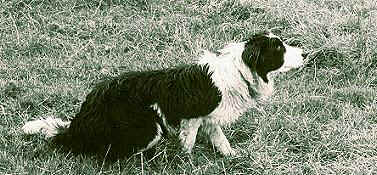
A border collie is happiest working sheep.
Focused and alert, but not hyperactive.
After a checking process and follow up call, suitable homes are registered and we start trying to match them up to a dog.
Its a dual process. We look for homes that can give a dog what it needs from those offered, but if a home looks good for a particular dog, that dog still has to fit the criteria of the person offering the home for a match to be made.
If a home appears to be suitable for a particular dog we will tell the people all about the dog and if the match seems right to them we arrange a home visit. This visit helps us verify that the dog is right for the home and vice-versa.
If there is a problem with the home visit we can advise on how to remedy it and come back again later when the situation is resolved. On conclusion of a successful home visit, we arrange for the applicant to meet the dog and, if they like the dog it will be offered for a pre-adoption trial period of a month to see how it gets on in its new home.
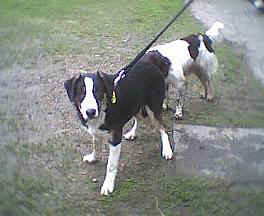
start his career with sheep and cattle
During this trial period we expect the new home to provide us with a weekly update on the dogs progress so we can monitor the situation and offer any advice when appropriate. We may also do a follow up visit at the end of the trial.
At the end of the month, by mutual agreement and providing all has gone well, the dog can be adopted by the applicant making a voluntary donation to the work of the charity. Unlike many charities, we do not have a fixed charge.
After adoption. we do like to stay in touch with our dogs, offering help, advice and support if needed. If anyone who has adopted a dog from us is unable to keep the dog, at any point in the future and for any reason whatsoever, the arrangement will be that the dog comes back to our care. Most people find this re-assuring.
We try to only offer dogs that will suit the requirements of the new home, after all we want them to stay there and we only want to re-home each dog once ion its lifetime.
We can offer dogs for adoption anywhere in the UK but only to people who are resident in the UK.
If a situation arises later, where a person emigrates or moves abroad for an
indefinite period of time, that is different, but we do need to have put in place some sort of arrangement for the return of the dog to the UK in the event of something
occurring to prevent the dog remaining with the people with whom we placed it.
AND FINALLY -
The Border Collie is not your ‘average dog’.
The breed has additional and exceptional qualities due to its long heritage as a Working Sheepdog.
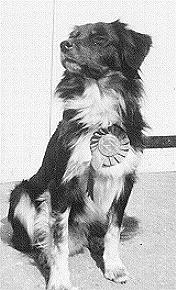
Moffat - the first dog rescued
by Nicki Oliver back in 1970.
They have greater needs than the 'average' dog and attempts to treat then simply as ‘a dog’ will be courting problems.
The very qualities that make them attractive can work against the breed when kept as a pet.
Because of the fine tuning of the breeds instincts, the wrong home, environment or handling can often quickly bring out behavioural problems and this has led to the breed getting a reputation amongst pet owners for being highly strung and hyperactive.
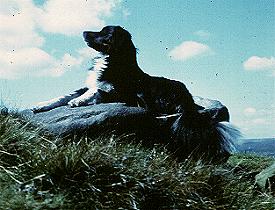
Hyperactive behaviour is not natural for the breed and is the result of stress, trauma or bad breeding.
A hyperactive Border Collie is suffering.
The worst of it is that many owners seem unaware that their dog is suffering and see these behavioural problems as amusing quirks or simply as a nuisance and an inconvenience to themselves.
Although the latter is certainly true, the dog suffers the worst of these situations.
To understand the Border Collie you need to understand it’s herding background and why it was bred to be what it is.
We have many pages on this site and our other websites, with lots of information which will help.
Its worth bearing in mind that the great majority of problem Border Collies we are asked to take in each year, come from pet homes - not from farms.
If you are interested in adopting a Border Collie from us,
please do not write to us or email us - we want to speak to you before we start the process.
Please phone us during office hours. Details here.
Calls to our office and
mobile will only be answered during our office hours






























